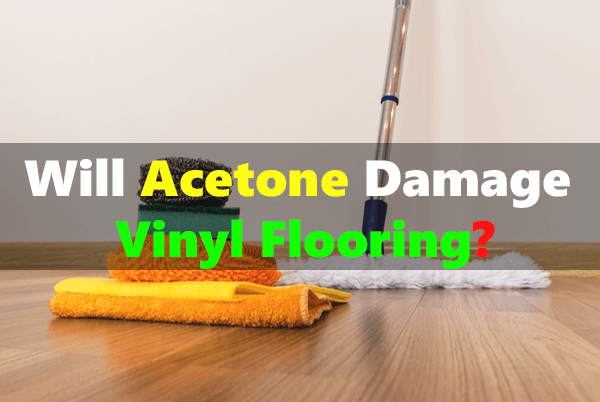Vinyl flooring is a sought-after surface option as it is delicate & shine, convenient to clean, and waterproof.
But the problem is its messy installation. For installing the vinyl surface, we need to use adhesive. And it creates and forms messes, no matter how careful you are.
However, you can efficiently remove the sticky adhesive from the floor using acetone.
The danger of acetone is it’s a harsh chemical. So, the question that appears in our mind is- Will acetone damage vinyl flooring?
Don’t be upset!!
We will cover everything in this guide to break down the puzzle and provide the answer you are looking for. Without further ado, let’s get started right here.
Contents
What is acetone?
Acetone, also known as propanone, is a type of solvent. It is a colorless, flammable, and highly volatile liquid that has a strong odor.
As acetone is miscible with water, this solvent has been used for many years to clean or remove stains from the floor.
Generally, the primary element of the nail polish removers is acetone. It can break down the nail polish or other sticky adhesive and remove them.
For example, using acetone, you can remove the stubborn glue that sticks with the vinyl surface when installing. It works better and has less odor compared to that paint thinner.
However, many of us are concerned about the safety of our delicate surface as it is harsh.
Is acetone safe on vinyl floors?
Acetone is a powerful solvent and harsh chemical. Though the vinyl surface is waterproof and durable, it damages the finish and appearance of the LVP floor.
The powerful chemical (acetone) can dissolve most plastics. So, it can also dissolve the vinyl base and bubble up your flooring when applied.
Indeed, acetone is not friendly to vinyl, which dulls the finish of your subtle flooring.
However, the positive side of acetone is- it evaporates quickly. So, the limited use of it on the LVP surface may not bring the real damage.
But we highly recommend you not to use this to take the risk of making your surface warp and damaging its finish.
Will acetone remove floor adhesive?
The short answer is- Yes.
Chemicals contained in acetone react with the glue and dissolve it. As a result, you can remove the adhesive from the surface by scrubbing away.
Now, you may ask- how to apply acetone to remove adhesive without damaging the vinyl base?
We noted above that proper use of acetone will limit the damage.
Here how you can use the acetone:
Firstly, use a hand scraper to scrape away the glued spot gently.
Secondly, take some safety precautions like wear gloves and a face mask. Open the window and run a box fan to keep the room ventilated.
Thirdly, pour the acetone into a container. Then, dip a toothbrush into the acetone formula and apply it around the affected area.
Next, start scrubbing the spot with the toothbrush. Continue to scrub until it removes every speck of glue.
Finally, soak a soft microfiber cloth with acetone and wipe down the floor to eliminate the adhesive leftover.
How to remove sticky tile glue from the floor without acetone?
From this chapter, you can learn how to remove adhesive from the vinyl base without damaging its finish.
Using warm water, you can get rid of the sticky glue from the surface efficiently.
Make sure you don’t use boiling water, which may warp the vinyl base. Also, the extreme hot water will burn your skin while cleaning the tile.
To remove the adhesive, first off, take a bucket of warm water.
Secondly, pour the water to cover the spotted area and allow the water to penetrate the vinyl flooring adhesive.
Thirdly, use a soft microfiber cloth to scrub away the glue from the surface. Make sure you rinse the cloth every time you sweep the flooring. Otherwise, it may bring the adhesive back onto the base again.
Fourthly, use a scraper gently and remove the glued leftover.
Lastly, rinse the floor with clean water and let the surface dry.
You can add a fair amount of citrus solvent if the water alone fails to get rid of the glue.
Conclusion
So, will acetone damage vinyl flooring? Yes, it’s a harsh chemical and damages & dulls the finishes of your delicate surface.
However, the proper use of the solvent doesn’t bring any real damages to your LVP flooring. But we recommend you not to use acetone to get rid of the adhesive from the surface. Instead, you can try out the warm water and a hand scraper to eliminate glue from the vinyl base.
Now, it’s up to you.
Are you going to try out the warm water solution to get rid of vinyl floor adhesive?
Let us know by leaving a comment below.

